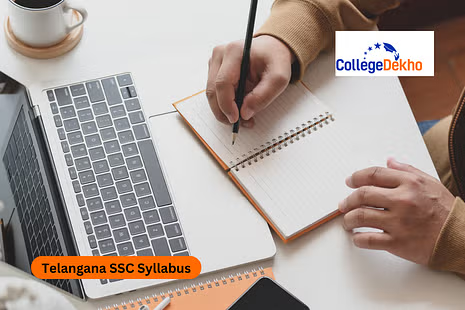Telangana SSC Syllabus 2024-25 will help students prepare for the upcoming board exams. Students can download the syllabus by visiting the official website of the Board of Secondary Education Telangana as soon as it is released.
- About Telangana SSC Syllabus 2024-25
- TS SSC Latest Updates 2025
- Telangana SSC Syllabus 2024-25 Download PDF
- Telangana SSC Science Syllabus 2024-25
- Telangana SSC Mathematics Syllabus 2024-25
- Telangana SSC Social Science Syllabus 2024-25
- Telangana SSC English Syllabus 2024-25
- Benefits of Knowing the Telangana SSC Syllabus 2024-25
- Telangana SSC Exam Pattern 2024-25
- Telangana SSC Syllabus 2024-25: Preparation Tips
- Faqs


Never Miss an Exam Update
About Telangana SSC Syllabus 2024-25
Directorate of Government Examinations Telangana is responsible for creating the syllabus and the curriculum for class 10th students. The official syllabus PDF is uploaded on their official website at bse.telangana.gov.in. 100 marks are allotted for every subject included in the curriculum, which are further divided into theory and practical exams depending upon the subject. There are a total of 3 non-language subjects included in the TS SSC curriculum followed by 6 language subject,s which can be chosen by the students according to their fluency. The non-language subjects include Mathematics, Social Science, and Science. For Science and Social Science, two papers will be conducted for 50 marks each.
Students must download the latest TS SSC Exam Pattern 2024-25 to check the marking scheme. Students are required to score at least 35 marks out of the total 100 to be declared as a pass and considered for the passing certificate. Check out more information about the Telangana SSC Syllabus 2024-25 here:
TS SSC Latest Updates 2025
- 17th March 2025: The Board of Secondary Education Telangana is expected to release the TS SSC Result 2025 on April 30, 2025, at 11 AM. The result link will be activated on the official website to be checked by using the roll number. The TS SSC exams 2025 will be conducted between March 21 and April 4, 2025, in pen-and-paper format.
Telangana SSC Syllabus 2024-25 Download PDF
The candidates can download the PDF for the subject-wise Telangana Class 10 Syllabus. The PDF files are available for previous years. The links will be updated as the board releases the TS SSC syllabus 2024-25:
Subjects | Syllabus |
|---|---|
Hindi | |
Telugu | |
English | |
General Science | |
Mathematics | |
Biology | |
Physical Science | |
Environmental Science | |
Social Studies |
Also Check: TS SSC Time Table 2025
Telangana SSC Science Syllabus 2024-25
TS SSC Science Syllabus 2024-25 is divided into two parts to be studied individually by the students. Students can refer to the syllabus for the different papers from the table given below:
Physical Science
Unit | Sub - Topics |
|---|---|
|
Spherical mirrors, convex and concave mirrors Pole, Focus, Centre of curvature, principle axis, Radius of curvature, Focal length Formula for spherical mirrors – sign convention Application of reflection – Solar Cooker, etc. |
|
Chemical equations – writing chemical equations, skeletal chemical equations, balancing chemical equations Writing symbols of physical states, Heat changes, gas evolved and precipitate formed Interpreting a balanced chemical equation |
|
What do acids have in common? What do bases have in common? Do Acids produce Ions only in Aqueous Solution? Reaction of Acid, Base with water Strength of Acid or Base – pH scale Importance of pH in everyday life Salts Chemicals from common salt |
|
Lenses Rules for Ray diagram Images formed by the lenses Formula derived for thin lenses Focal length of lens depends on the surrounding medium Lens maker formula |
5. Human eye and colourful world |
Structure of human Eye – Focal length of human Eye lens, accommodation Common accommodation defects of vision – Myopia, Hypermetropia, presbyopia Prism Scattering of light |
6. Structure of atom |
Electromagnetic Spectrum Bohr’s model of a Hydrogen atom and its limitations Quantum mechanical model of an Atom Electronic Configuration of elements in their atoms nl rule, Energies of electronic energy levels (n+l) rule; Aufbau Principle, Pauli’s principle, Hund’s Rule of maximum multiplicity, Stable configurations |
7. Classification of Elements – The Periodic Table |
Doberieners Triads – Limitations Newland’s law of Octaves Mendeleev’s Periodic Table (Periodic law, Achievements & Limitations) Modern Periodic Table. |
8. Chemical Bonding |
Electronic theory of Valence by Lewis and Kossel Ionic and Covalent bonds: examples with Lewis Dot formulae The arrangement of Ions in Ionic compounds Factors affecting the formation of cation and anion Shapes, bond lengths and bond energies in molecules Valence shell electron pair repulsion theory Valence bond theory Properties of Ionic and Covalent Compounds |
9. Electric Current |
Potential difference How a battery or a cell works Ohms law and its limitations, resistance, specific resistance, factors influencing resistance, electric shock Electric Circuits Electric power Safety fuses |
10. Electromagnetism |
Magnetic field – field lines Magnetic field due to currents Magnetic force on moving charge and current carrying wire Electric motor Electromagnetic induction – Faraday’s law (including magnetic flux) – Lenz law Generators and Alternating – Direct Currents |
11. Principles of Metallurgy |
Extraction of metals from the Ores – activity series and related metallurgy, flow chart of steps involved in the extraction of metals from ore. Corrosion – Prevention of Corrosion Important Processes used in metallurgy Flux Furnace |
12. Carbon and its compounds | Introduction of Carbon compounds Promotion of an Electron – Bonding in Carbon including Hybridization Allotropes of Carbon Versatile nature of carbon Hydrocarbons Bonding of carbon with other elements Isomerism Homologous series Nomenclature of carbon compounds Chemical properties of carbon compounds Important carbon compounds Esterification reactions Soaps – Saponification, Micelles |
Biology
Nutrition | Life process- Introduction Photosynthesis Nutrition in organisms Digestion in human beings Healthy points about oesophagus Malnutrition |
|---|---|
Respiration |
Respiratory system in human being Cellular respiration Respiration – Combustion Evolution of gaseous exchange Plant respiration |
Transportation |
Cardiac cycle Lymphatic system Evolution of transport system Blood pressure Blood clotting Transportation in plants |
Excretion | Excretion in Human beings Excretory system Structure of Nephron Formation of urine Dialysis – Artificial kidney Accessory Excretory organs in human being (Lungs, skin, liver large intestine) Excretion in other organisms Excretion in plants Excretion, Secretion |
Coordination | Stimulus and response Integrated system – Nerves coordination Nerve cell structure Pathways from stimulus to response Reflex arc Central nervous system Peripheral nervous system Coordination without nerves Autonomous nervous system Coordination in plants – Phytohormones |
Reproduction | Growth of bacteria in milk. Asexual reproduction Sexual reproduction Sexual reproduction in plants Cell division – Cell cycle Reproductive health – HIV/ AIDS |
Coordination in Life Processes | Hunger Relation between taste and smell Mouth – a mastication machine Passage of food through oesophagus Stomach is mixer |
Heredity and Evolution | New Characters – variation Experiments conducted by Mendal (F1 generation,F2 generation), Mendel’s Laws Parents to offsprings Evolution Origin of species Evolution – Evidences Human Evolution |
Our Environment | Ecosystem – Food chain Human activities – Their effect on ecosystem Biological pest control measures |
Natural resources | Case study – Agricultural land (past and present) Case study – Water management Water resources in the Telugu States Natural resources around us Forest Renewable resources Fossil fuels Conservation, Reduce, Reuse, Recycle, Recover |
Also Read: TS SSC Science Sample Paper 2024-25
Telangana SSC Mathematics Syllabus 2024-25
Students can refer to the detailed information about the TS SSC Math Syllabus 2024-25 from the table given below:
Chapters |
|---|
Chapter 1 - Real Numbers |
Chapter 2 - Sets |
Chapter 3 - Polynomials |
Chapter 4 - Pair of Linear Equations in Two Variables |
Chapter 5 - Quadratic Equations |
Chapter 6 - Progressions |
Chapter 7 - Coordinate Geometry |
Chapter 8 - Similar Triangles |
Chapter 9 - Tangents and Secants to a Circle |
Chapter 10 - Mensuration |
Chapter 11 - Trigonometry |
Chapter 12 - Applications of Trigonometry |
Chapter 13 - Probability |
Chapter 14 - Statistics |
Also Read: TS SSC Math Sample Paper 2024-25
Telangana SSC Social Science Syllabus 2024-25
The following units and chapters are included in the TS SSC Social Science Syllabus 2024-25 according to the latest curriculum PDF available online:
Units | Chapters |
|---|---|
India: Relief Features | Geological background Major relief divisions, - The Himalayas, The Indo- Gangetic Plain, The Peninsular Plateau, The Thar Desert, The Coastal Plains, and the Islands. |
Ideas on Development | Income and other Goals How to compare Different Countries or States Income and Other Criteria Public Facilities Human Development Report – India and its neighbours for 2015 data. Development as progress over time |
Production and Employment | Sectors of Economy Gross Domestic Product (GDP) Changes in the importance of sectors: the value of goods and services produced and employment of people. Employment – the working life in India How to create more and better conditions of employment |
Climate of India | Climate and Weather Climographs – India Factors influencing climate and weather Winter Summer Advancing monsoon, Retreating monsoon |
Indian Rivers and Water Resources | The Himalayan Rivers: The Indus system, The Brahmaputra system The Peninsular Rivers Water use Inflows and Outflows Rational and equitable Use of water – a case study of Hivre Bazar of Maharashtra |
The Population | A survey of our own area (population) What does the census show? Age structure Sex Ratio Literacy Rates Life Expectancy Population Growth and Processes of Population Change |
Settlements: Migrations | What is a settlement? Urbanisation in India Indian settlements in the hierarchy Aerotropolis – jet – age city Measure and classify migration patterns Migration in India (census 2001, 2011) Rural-Urban migration Seasonal and temporary Migration International migration |
Rampur: A Village Economy | The story of Rampur village Land and other natural resources The story of Rampur village Farming in Rampur Land and other natural resources |
Globalisation | Production across Countries Interlinking Production Across Countries Foreign trade and Integration of market What is Globalisation Liberalization of foreign and foreign investment policy Institutions of Global Governance World Trade Organisation (WTO) Impact of Globalisation in India Small Producers? The struggle for a fair Globalisation |
Food Security | Food security for the country Increasing food grain production Availability of Foodgrains Other food items Access to food Public Distribution System(PDS) Nutrition status |
Sustainable Development with Equity | Development again… Environment and development People’s Rights over Environment Towards Sustainable Development with Equity An alternative Public Distribution system |
World between World Wars | World war Causes of the two world wars compared Aggressive nationalism, Imperialism, Secret Alliances, The Armaments Race, Militarism. The special contest of the Second World War The Treaty of Versailles The League of Nations German Challenge to Revengeful Domination The fear of Socialism and the USSR Consequences of the World Wars Enormous human cost Democratic Principles asserted Second World War 1939-1945 The new balance of power New International Organisations Enfranchisement of women Russian Socialist Revolution The great depression Rise of Nazism in Germany The defeat and end |
National Liberation Movements in the Colonies | China: two different phases. Establishing the Republic The Rise of the Communist Party of China Establishing the New Democracy: 1949-1954 Land Reforms Vietnam: Against two colonizers The colonial experience Emergence of Vietnamese Nationalism The New Republic of Vietnam The entry of the US into the War Nigeria: forming unity against the colonizers British colonialism and the making of a Nation Independent and week Democracy Oil, environment and politics |
National Movement in India – Partition & Independence 1939-1947 | The Muslim League The Hindu Mahasabha and the RSS The Pakistan Resolution Who will make the British Quit India? The popular upsurge 1946-48 |
The Making of Independent India’s Constitution | Revisiting the Indian constitution Nepal Constitution preamble2007 Japan Constitution preamble1946 Constituent Assembly Debates Draft constitution The vision of the constitution Debate on fundamental rights The Constitution Today |
Election Process in India | Election system in India The election commission Political parties in the election Conduct of elections at various levels Voting mechanism NOTA The need for electoral reforms |
Independent India (The first 30 years 1947-1977) | First general elections Election procedure One-party domination in political system Demand for State Reorganization State Reorganization Act,1956 SRC – State is organization commission Social and Economic change Foreign policy and wars Anti-Hindi agitation Green Revolution Bangladesh war Emergency |
Emerging Political Trends (1977-2000) | Return of Democracy After Emergency Elections – 1977 – End of Emergency Some important parties of 1970s BLD, Congress, CPI (M), DMK, Jan Sangh, SAD Regional party -Telangana Assam movement The Punjab Agitation The new initiatives of Rajiv Gandhi Era Rise of Communalism and Corruption in High places |
Post-War World and India | After world war–II UNO Cold war(1945-1991) Proxy war Military alliances Arms and space-race NAM West Asian conflicts Growth of Nationalism in middle east Peace movements Collapse of the USSR |
Social Movements in Our Times | Civil Rights and Other Movements of 1960s Human Rights Movements in the USSR Anti-nuclear and Anti-War Movements Globalization, marginalized people and environmental movements Greenpeace Movement in Europe Bhopal Gas Disaster-related movements Silent Valley Movement 1973-85 Movement of women for SocialJustice Aadavallu Ekamaite Social mobilization on human rights Meria PaibiMovement |
The Movement for the Formation of Telangana State | The merger of Hyderabad State with India The Gentlemen’s Agreement Mulki Rules Movements in1990s In the process of achieving Telangana Telangana Achieved Prof. Jaya Shanker |
Also Read: TS SSC Social Science Sample Paper 2024-25
Telangana SSC English Syllabus 2024-25
It is important to have detailed information about the TS SSC English Syllabus 2024-25 to start your study sections. Check out the syllabus here:
Units | Chapters |
|---|---|
Personality Development | Attitude is Altitude Biography Every Success Story Is Also Narrative: A Story of Great Failures Essay I Will Do It Biography |
Wit and Humor | The Dear Departed (Part - I) Play The Dear Departed (Part - II) Play The Brave Potter Folk Tale |
Human Relations | The Journey Narrative Another Woman Poem The Never-Never Nest Play |
Films and Theatre | Rendezvous with Ray Essay Maya Bazaar Review A Tribute Essay |
Social Issues | The Storeyed House (Part - 1) The Storeyed House (Part - (1) Abandoned (Poem) |
Bio-Diversity | Environment Or will the Dreamer Wake? (Poem) A Tale of Three Villages |
Nation and Diversity | My Childhood A Plea for India (Poem) Unity in Diversity in India |
Human Rights | Jamaican Fragment Once Upon a Time (Poem) What is my Name? |
Also Read: TS SSC English Sample Paper 2024-25
Benefits of Knowing the Telangana SSC Syllabus 2024-25
Knowing the syllabus will help the students to plan out their studies systematically to score higher marks in the exam. Check some of the advantages of knowing the syllabus from the pointers given below:
- The syllabus will help students to make a study plan for the exams.
- Students will get knowledge about the units and the chapters included in the curriculum through the syllabus PDF.
- Students can easily track their preparation by downloading the syllabus and checking the units that are left for study.
- The learning outcome of the curriculum is easily known through the detailed syllabus.
- Downloading the syllabus is the first step towards developing a systematic strategy to get good marks in the results.
Telangana SSC Exam Pattern 2024-25
The candidates must keep in mind the following important points related to Telangana Class 10 Exam Pattern 2024-25:
- The students will have to opt for six subjects for the exam in a fixed pattern.
- Out of the six subjects, there will be three language papers, and the other three will be General Science, Social Studies, and Mathematics.
- There will be eleven papers in these six subjects, and each subject will have two papers, except a second language paper.
- There will be 100 marks for each paper in the exam. Of these 100 marks, the summative assessment (board exam) is for 80 marks, and the formative test is for 20 marks.
- The minimum passing marks for each paper are 35 marks.
- The marks breakup for Telangana Class 10 Exam Pattern 2024-25 has been given below:
Subjects | Theory Marks | Internal Assessment | Total |
|---|---|---|---|
First Language (Hindi/Urdu/Telugu) | 80 | 20 | 100 |
Second Language (Hindi/Telugu) | 80 | 20 | 100 |
Third Language (English) | 80 | 20 | 100 |
Mathematics (Paper 1) | 40 | 10 | 50 |
Mathematics (Paper 2) | 40 | 10 | 50 |
Physical Science | 40 | 10 | 50 |
Biological Science | 40 | 10 | 50 |
History and Civics | 40 | 10 | 50 |
Geography and Economics | 40 | 10 | 50 |
Telangana SSC Syllabus 2024-25: Preparation Tips
Students can go through the following essential tips to prepare for the Telangana SSC exams.
- First, check out the Telangana SSC Syllabus 2024-25. It is the most important step for board exam preparation.
- Reserve more time for the difficult subjects in your study schedule. Students must try to finish the syllabus beforehand to reserve some time for revision.
- After completing the syllabus, students should try solving the Telangana SSC Class 10 Previous Year Question Paper
- Make handwritten notes and go through them a day before the exam to quickly revise the entire syllabus.
- Check out the exam pattern for each of the subjects and pay attention to the chapters with high marks weightage.
- Clear all doubts before the exam by discussing them with your teachers or classmates.
FAQs
No, questions are totally based on the Telangana SSC Syllabus 2024-25. Students can simply follow the prescribed syllabus to write correct answers for all questions.
The English subject is divided into four units. The students can pay attention to the units one by one and complete the Telangana SSC Syllabus 2024-25. They can check the marks distributed to each of the chapters and pay more attention to the topics carrying high marks.
Students can prepare a study schedule and focus on important topics to complete the Telangana SSC Syllabus 2024-25. They can solve questions through sample papers to gain accuracy and speed. They have to attempt all questions to score good marks.
Students must cover up the entire Telangana SSC Syllabus 2024-25 in advance in order to avoid eleventh hour hassle. In addition, they should keep time for revision of each of the subjects.
Students can visit the official website of Telangana board and check the Telangana SSC Syllabus 2024-25. The board provides syllabus for each of the subjects in the PDF format. Students can easily download and save the PDF files.
TS SSC Board exams include easy-to-moderate questions. All subjects have a combination of simple and difficult questions.
It can be assumed that there will be no reduction in the Telangana SSC Syllabus 2024-25. Students have to appear for the exams with a 100% syllabus. Each of the subjects will be of 100 marks, which includes theory marks and internal assessment marks.
There are six subjects in total that students will have to appear for. The students will have to study Hindi, English, Telugu, Mathematics, General Science, and Social Science as per the Telangana SSC Syllabus.
Students need to score at least 35% marks in each of the subjects. The students who will score a minimum of 35% aggregate marks as well as in each of the subjects will only be considered passed.
Was this article helpful?














